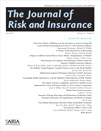
JOURNAL OF RISK AND INSURANCE
Scope & Guideline
Shaping the discourse on risk management excellence.
Introduction
Aims and Scopes
- Risk Management Strategies:
The journal examines various strategies for managing risk across different sectors, including financial, health, and property insurance. This includes analysis of risk-sharing, risk classification, and the impact of regulatory frameworks. - Behavioral Aspects of Insurance:
Research delves into the behavioral economics of insurance, exploring how consumer behavior, perceptions of risk, and decision-making processes influence insurance uptake and policy design. - Impact of Technology on Insurance:
The journal explores the role of technology, including insurtech, big data, and machine learning, in transforming insurance practices, improving risk assessment, and enhancing customer engagement. - Economic and Policy Analysis:
There is a strong emphasis on the economic implications of insurance policies, including the effects of regulation, market dynamics, and economic conditions on insurance practices and consumer choices. - Environmental and Social Risks:
The journal addresses emerging risks related to climate change, natural disasters, and social inequalities, focusing on how these factors influence insurance markets and risk management practices.
Trending and Emerging
- Climate Change and Insurance:
Research on the intersection of climate change and insurance is on the rise, reflecting an urgent need to address environmental risks and develop sustainable insurance solutions. - Usage-Based Insurance Models:
There is a growing interest in usage-based insurance, particularly in auto and health sectors, driven by technological advancements and changing consumer behaviors. - Cyber Risk Management:
With the increasing prevalence of cyber threats, there is a notable trend towards exploring insurance solutions for cybersecurity risks, highlighting the evolving landscape of risk management. - Social Equity in Insurance:
Emerging themes focus on the role of insurance in addressing social inequalities and improving access for underserved populations, indicating a shift towards more socially responsible insurance practices. - Advanced Data Analytics in Insurance:
The use of big data and machine learning techniques is becoming central to the research agenda, reflecting the industry's shift towards data-driven decision-making and personalized insurance offerings.
Declining or Waning
- Traditional Risk Assessment Models:
There is a noticeable decrease in publications focusing solely on traditional risk assessment models, as new methodologies incorporating advanced analytics and data-driven approaches gain traction. - Static Insurance Products:
Research on static insurance products, such as standard life or health insurance policies, has waned, possibly due to a growing interest in more dynamic and flexible insurance solutions that better meet consumer needs. - Local or Regional Insurance Issues:
The journal has shifted away from region-specific insurance challenges, focusing instead on global themes and broader economic implications, which may indicate a decrease in localized studies. - Historical Insurance Practices:
There has been a decline in research examining historical insurance practices and their evolution, as contemporary issues and future trends take precedence.
Similar Journals
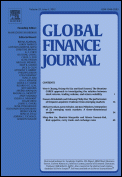
Global Finance Journal
Elevating discourse in finance and economics.Global Finance Journal is an esteemed periodical published by Elsevier, dedicated to the dynamic fields of finance and economics. With an impressive history spanning from 1989 to 2024, this journal holds a significant position in the academic community, boasting a Q1 quartile ranking in both Economics and Econometrics, as well as Finance, as of 2023. It is highly regarded in Scopus rankings, placing 40th out of 317 in Finance and 99th out of 716 in Economics and Econometrics, demonstrating its influence and reach among researchers and practitioners alike. Although not an open-access journal, the Global Finance Journal provides rigorous peer-reviewed articles that explore critical issues, advance theoretical frameworks, and address practical applications in global finance. As such, it serves as a vital resource for researchers, financial professionals, and students aiming to deepen their understanding of economic phenomena and contribute to the ongoing discourse in these vibrant disciplines.
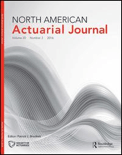
North American Actuarial Journal
Empowering Research in Economics and ProbabilityNorth American Actuarial Journal is a prominent publication in the fields of Economics and Econometrics, Statistics and Probability, and Statistics, Probability and Uncertainty, published by Routledge Journals, Taylor & Francis Ltd. The journal, with the ISSN 1092-0277 and E-ISSN 2325-0453, covers critical advancements in actuarial science over the years from 1997 to 2024. With a strong Q2 ranking in multiple categories for 2023, the journal positions itself as a vital resource for researchers and practitioners looking to stay abreast of current trends and methodologies in actuarial practices. The journal’s focus on providing a platform for high-quality research makes it indispensable for professionals and academics alike, offering insightful contributions that influence the actuarial field's evolution. While it currently does not offer open access options, its rigorous peer-review process ensures the integrity and relevance of its published works. Researchers, professionals, and students in actuarial science will find this journal to be a valuable asset for both their studies and professional development.

JOURNAL OF AGRICULTURAL AND RESOURCE ECONOMICS
Bridging theory and practice in agricultural economics.Journal of Agricultural and Resource Economics is a pivotal platform in the realm of agricultural and resource economics, published by the Western Agricultural Economics Association. Since its inception, the journal has embraced an Open Access model, fostering widespread dissemination of research findings to benefit both scholars and practitioners in the field. The journal operates within an impressive global ranking framework, resting in Q2 across several pertinent categories including Agronomy and Crop Science, Animal Science and Zoology, and Economics and Econometrics. With its ISSN 1068-5502 and E-ISSN 2327-8285, it has garnered attention for its rigorous academic standards and impactful contributions to the discourse on resource management and agricultural practices. Researchers, professionals, and students alike will find the journal's ongoing commitment to advancing knowledge invaluable, with publications that span from 1996 to 2024 capturing evolving trends and insights in the sector.
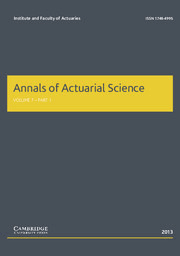
Annals of Actuarial Science
Exploring innovative insights in economics and statistics.Annals of Actuarial Science, published by Cambridge University Press, stands as a prominent academic journal in the fields of economics, statistics, and actuarial science. With an ISSN of 1748-4995, it features rigorous research aimed at advancing knowledge and practice in areas related to risk management, data analysis, and probability. The journal is recognized for its significant impact, holding a Q2 category ranking in both Economics and Econometrics and Statistics and Probability, along with notable positioning within Scopus rankings. Although it does not currently offer open access, its comprehensive selection of scholarly articles from 2010 to 2024 remains invaluable to researchers, professionals, and students alike, providing insights that drive the actuarial profession and enhance decision-making processes across various sectors. Positioned at the intersection of theoretical innovation and practical application, the Annals of Actuarial Science continues to shape the discourse and development of its disciplines.

Risks is an esteemed Open Access journal published by MDPI, based in Switzerland, dedicated to exploring multifaceted dimensions of risk across various fields, including Accounting, Economics, Finance, and Management. Since its inception in 2013, the journal has fostered academic discourse by providing a platform for high-quality research that addresses contemporary challenges and theoretical advancements within these disciplines. With a commendable ranking in the 75th percentile for Economics, Econometrics and Finance, and distinction in Accounting and Strategy Management, Risks maintains robust academic quality that resonates within the global research community. The journal not only prioritizes accessibility with its Open Access model but also aims to bridge the gap between academia and industry through rigorous peer-reviewed publications. Researchers, professionals, and students alike will find Risks to be an invaluable resource for innovative insights and evidence-based analyses in the field of risk management.
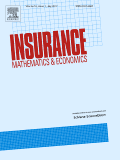
INSURANCE MATHEMATICS & ECONOMICS
Transforming theoretical frameworks into practical applications.Insurance Mathematics & Economics, published by Elsevier, stands as a pivotal journal in the fields of economics and statistics, carrying the ISSN 0167-6687 and E-ISSN 1873-5959. Established in 1982, this journal aims to disseminate high-quality research that integrates insurance theory with economic principles, making significant contributions to both academic and practical spheres. With a notable Q1 ranking in the 2023 category quartiles for Economics, Econometrics, Statistics, and Probability, and a solid standing in Scopus ranks, it ranks #64 out of 278 in Mathematics and #45 out of 168 in Decision Sciences, showcasing its relevance and prestige in the research landscape. The journal not only facilitates a deeper understanding of insurance-related mathematical methodologies but also emphasizes the application of these techniques in real-world economic contexts. Researchers, professionals, and students alike can benefit from its rigorous approach to the challenges faced in insurance and economics, making it an essential resource for anyone involved in these dynamic fields.

Journal of Risk
Unraveling the Dynamics of Risk in a Changing WorldJournal of Risk, published by INCISIVE MEDIA, serves as an essential platform for scholars and practitioners in the fields of finance and strategic management. With an ISSN of 1465-1211 and an E-ISSN of 1755-2842, this journal explores the multifaceted nature of risk, encompassing theoretical frameworks, empirical investigations, and practical applications. Although currently classified in Q4 for both Finance and Strategy and Management categories as per 2023 standards, it provides a crucial forum for innovative research and thought leadership, addressing the challenges faced in understanding and managing risk in today’s dynamic environment. The journal, based in the United States, is committed to advancing knowledge and offering a platform for debate and dialogue in its convergence years from 2011 to 2024. Researchers, professionals, and students are encouraged to contribute their insights to enhance the academic discourse surrounding risk management.
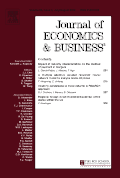
JOURNAL OF ECONOMICS AND BUSINESS
Illuminating the Path to Economic UnderstandingJOURNAL OF ECONOMICS AND BUSINESS, published by Elsevier Science Inc, stands as a leading platform for the dissemination of research in the fields of economics and business management. With an ISSN of 0148-6195, this journal is indexed in Scopus and boasts impressive rankings, including a position in the top 20% for both Finance and Economics and Econometrics. With a consistent publication history since 1978, it has become a vital resource for scholars and practitioners alike, providing insights into contemporary issues and emerging trends in the economic landscape. The journal, categorized in the Q2 quartile for both Business and Economics, invites rigorous research that advances theoretical and practical knowledge. While it operates under a subscription model, its notable impact factor reflects its significance and relevance in addressing critical questions within the business and economics domains. Whether you are a researcher, a business professional, or a student eager to deepen your understanding, the JOURNAL OF ECONOMICS AND BUSINESS is an essential resource for your academic and professional journey.

Journal of Insurance Issues
Navigating the Evolving Landscape of Insurance IssuesJournal of Insurance Issues, published by the Western Risk & Insurance Association, stands as a pivotal platform for the exploration and dissemination of knowledge in the field of insurance and risk management. With an ISSN of 1531-6076 and an E-ISSN of 2332-4244, this journal delves into the complexities and evolving dynamics of insurance practices, policies, and theoretical underpinnings. Although not an open-access journal, it remains accessible to a broad audience, including academics, practitioners, and students eager to engage with rigorous research and innovative ideas. The journal is dedicated to enhancing understanding in critical areas such as risk assessment, regulatory impacts, insurance economics, and consumer behavior, thereby contributing significantly to the professional discourse within the insurance sector. Its robust editorial standards ensure that published works meet high-quality scholarly criteria, further establishing the journal as an essential resource for anyone interested in the multifaceted world of insurance.

AUSTRALIAN JOURNAL OF AGRICULTURAL AND RESOURCE ECONOMICS
Fostering dialogue for a sustainable agricultural future.Introducing the AUSTRALIAN JOURNAL OF AGRICULTURAL AND RESOURCE ECONOMICS, a premier publication dedicated to advancing the fields of agricultural and resource economics. Published by Wiley in the United Kingdom, this journal boasts an impressive Impact Factor, reflecting its significance and influence within its disciplines. Classified as Q1 in Agricultural and Biological Sciences and Q2 in Economics and Econometrics for 2023, it ranks among the top journals in these fields, with notable Scopus rankings of 16/193 and 121/716 respectively. With convergence from 1996 to 2024, the journal aims to disseminate innovative research, critical analysis, and empirical studies that address pressing economic issues in agriculture and resource management. Through its commitment to high-quality research and multiple open access options, the AUSTRALIAN JOURNAL OF AGRICULTURAL AND RESOURCE ECONOMICS serves as an essential resource for researchers, professionals, and students alike, fostering knowledge and dialogue in this vital area of study.